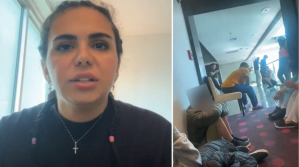
For Artemis Ghasemzadeh, a 27-year-old Iranian woman, embracing Christianity was both a spiritual awakening and a life-threatening choice.
Born into a conservative Muslim family in Isfahan, Iran, her journey into Christianity began in 2019 when she first stepped into a church while visiting Turkey.
Overcome by a deep sense of peace, she purchased a small Bible, smuggling it back home wrapped in her clothes. What started as curiosity evolved into a full conversion, culminating in her baptism three years ago – a moment she describes as being “reborn”.
Ghasemzadeh has said she cherished her Christian community and her older brother, Shahin, 32, has also converted to the faith.
In Iran, Christianity is tolerated only for those born into it. However, under Sharia law, converting from Islam is considered blasphemy, punishable by death.
Despite the risks, Ghasemzadeh joined Iran’s underground Christian movement, attending secret Bible study sessions online and in clandestine locations.
The precautions were extreme – worshippers received one-time passwords to access virtual meetings, and gatherings were constantly relocated to avoid detection.
Artemis Ghasemzadeh’s faith strengthened amid Iran’s 2022 protests, sparked by the death of Mahsa Amini in police custody.
Like many women defying the hijab law, she let her long hair flow freely in public and took to the streets, chanting: “Women, Life, Freedom.” But government warnings followed, summoning her to court for violating Islamic dress codes. She ignored them.
With the noose of persecution tightening, she made the painful decision to flee.
In December 2024, Ghasemzadeh and her older brother Shahin left Iran, bound for the United States. The route was perilous: Abu Dhabi, South Korea, then Mexico City, where they paid smugglers $3,000 each to guide them to Tijuana. Under the cover of darkness, they scaled the border wall into the US.
“When my feet touched American soil, I burst into tears,” she recalled in an interview with The Times. “It’s over. We are finally here.”
But the relief was short-lived. US border agents quickly detained them, separating the siblings. She has not seen or spoken to Shahin since. Her mother later informed her that he was being held in a Texas facility.
Ghasemzadeh repeatedly told officials she was a Christian convert seeking asylum. However, a Department of Homeland Security spokesperson later claimed: “Not a single one of these aliens asserted fear of returning to their home country at any point during processing or custody.”
Ghasemzadeh contests this, stating she was never interviewed about her asylum claim. Instead, on February 12 – her 27th birthday – she says she was shackled, placed on a military plane, and deported to Panama.
Ghasemzadeh now finds herself in a migrant detention camp on the outskirts of the Darién jungle, alongside nine other Iranian Christian converts, including three children. Conditions are dire. The sleeping area is muggy, blankets are scarce, and migrants are given one bottle of water daily, refilled from a bathroom faucet.
Panamanian authorities insist detainees are well cared for, but their accounts say otherwise.
“We don’t deserve this. We are in a place where we feel helpless,” Ghasemzadeh said. “I am waiting for our voices to be heard, for someone to help us.”
She has taken to social media, sharing videos that detail their plight. One of these videos has gone viral in Persian media, drawing significant attention to their predicament.
Every night, Ghasemzadeh finds additional solace in writing Christian reflections in her notebook. One page, written in Persian, pleads, “I am certain you can hear my voice from up there. So please help.” Next to it, she has drawn a small red heart.
Ali Herschi, an Iranian-American human rights lawyer, has taken up their case pro bono. His immediate priority is preventing Panama from deporting them back to Iran, where they could face imprisonment or execution. His long-term goal is to convince the US authorities under the new Donald Trump administration to reverse course and grant the group entry on humanitarian grounds.